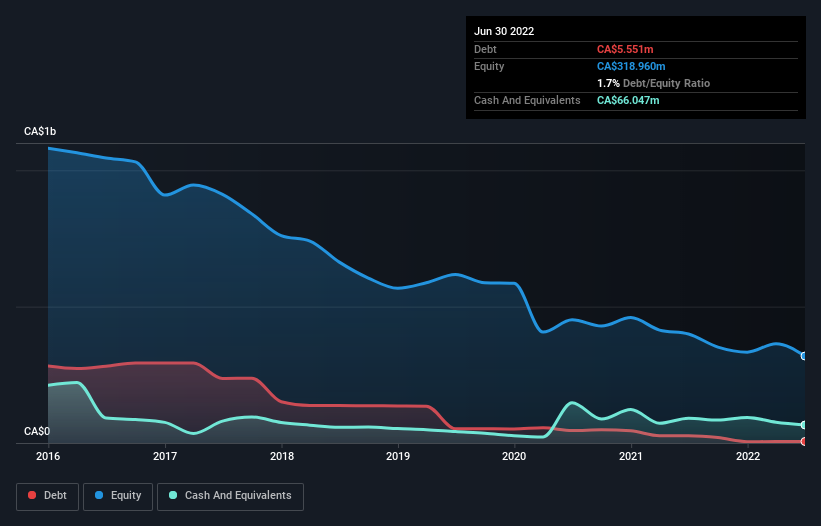The external fund manager backed by Berkshire Hathaway's Charlie Munger, Li Lu, makes no bones about it when he says 'The biggest investment risk is not the volatility of prices, but whether you will suffer a permanent loss of capital.' When we think about how risky a company is, we always like to look at its use of debt, since debt overload can lead to ruin. As with many other companies Dundee Corporation (TSE:DC.A) makes use of debt. But the real question is whether this debt is making the company risky.
What Risk Does Debt Bring?
Debt is a tool to help businesses grow, but if a business is incapable of paying off its lenders, then it exists at their mercy. Part and parcel of capitalism is the process of 'creative destruction' where failed businesses are mercilessly liquidated by their bankers. However, a more common (but still painful) scenario is that it has to raise new equity capital at a low price, thus permanently diluting shareholders. Of course, plenty of companies use debt to fund growth, without any negative consequences. When we think about a company's use of debt, we first look at cash and debt together.
View our latest analysis for Dundee
What Is Dundee's Net Debt?
As you can see below, Dundee had CA$5.55m of debt at June 2022, down from CA$26.4m a year prior. However, its balance sheet shows it holds CA$66.0m in cash, so it actually has CA$60.5m net cash.

How Strong Is Dundee's Balance Sheet?
According to the last reported balance sheet, Dundee had liabilities of CA$11.5m due within 12 months, and liabilities of CA$9.22m due beyond 12 months. Offsetting this, it had CA$66.0m in cash and CA$6.89m in receivables that were due within 12 months. So it can boast CA$52.2m more liquid assets than total liabilities.
This luscious liquidity implies that Dundee's balance sheet is sturdy like a giant sequoia tree. With this in mind one could posit that its balance sheet means the company is able to handle some adversity. Simply put, the fact that Dundee has more cash than debt is arguably a good indication that it can manage its debt safely. The balance sheet is clearly the area to focus on when you are analysing debt. But you can't view debt in total isolation; since Dundee will need earnings to service that debt. So if you're keen to discover more about its earnings, it might be worth checking out this graph of its long term earnings trend.
Over 12 months, Dundee made a loss at the EBIT level, and saw its revenue drop to CA$15m, which is a fall of 28%. To be frank that doesn't bode well.
So How Risky Is Dundee?
We have no doubt that loss making companies are, in general, riskier than profitable ones. And we do note that Dundee had an earnings before interest and tax (EBIT) loss, over the last year. Indeed, in that time it burnt through CA$19m of cash and made a loss of CA$77m. Given it only has net cash of CA$60.5m, the company may need to raise more capital if it doesn't reach break-even soon. Overall, its balance sheet doesn't seem overly risky, at the moment, but we're always cautious until we see the positive free cash flow. The balance sheet is clearly the area to focus on when you are analysing debt. However, not all investment risk resides within the balance sheet - far from it. For instance, we've identified 1 warning sign for Dundee that you should be aware of.
If, after all that, you're more interested in a fast growing company with a rock-solid balance sheet, then check out our list of net cash growth stocks without delay.
New: Manage All Your Stock Portfolios in One Place
We've created the ultimate portfolio companion for stock investors, and it's free.
• Connect an unlimited number of Portfolios and see your total in one currency
• Be alerted to new Warning Signs or Risks via email or mobile
• Track the Fair Value of your stocks
Have feedback on this article? Concerned about the content? Get in touch with us directly. Alternatively, email editorial-team (at) simplywallst.com.
This article by Simply Wall St is general in nature. We provide commentary based on historical data and analyst forecasts only using an unbiased methodology and our articles are not intended to be financial advice. It does not constitute a recommendation to buy or sell any stock, and does not take account of your objectives, or your financial situation. We aim to bring you long-term focused analysis driven by fundamental data. Note that our analysis may not factor in the latest price-sensitive company announcements or qualitative material. Simply Wall St has no position in any stocks mentioned.
About TSX:DC.A
Dundee
Through its operating subsidiaries, the firm is engaged in diverse business activities in the areas of investment advisory, corporate finance, energy, resources, agriculture, real estate and infrastructure.
Solid track record with adequate balance sheet.
Similar Companies
Market Insights
Community Narratives


Recently Updated Narratives


Engineered for Stability. Positioned for Growth.


MINISO's fair value is projected at 26.69 with an anticipated PE ratio shift of 20x


Fiverr International will transform the freelance industry with AI-powered growth
Popular Narratives


MicroVision will explode future revenue by 380.37% with a vision towards success


NVDA: Expanding AI Demand Will Drive Major Data Center Investments Through 2026



